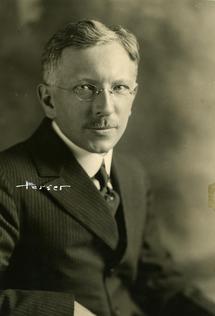
IRIS login | Reed College home Volume 96, No. 2: June 2017
Paradox Embraced: A History of Reed Presidents
Reed's presidential history, like that of the college itself, is a history of paradoxes.
This was the argument of trustee and historian John Sheehy '82 in his lecture "The Presidents of Reed" at Reunions 2012. The central paradox of Reed, he said, is the combination of academic conservatism with cultural progressivism. This has given birth over the years to such quandaries as Reed's historically high attrition rate (as students struggled to impose the self-discipline required for intellectual freedom) to ongoing debates like faculty pay equity or marijuana use on campus.
These conflicts, though, have by no means held Reed back. Instead, Sheehy said, "the only way to move forward was to work within the paradoxes." The Honor Principle was one example of this, occupying the "middle ground" between rules and anarchy. In the end, it has been how well each president has embraced the Reed paradox that has determined his success.
Sheehy started with founding president William Trufant Foster's ambitious and radical vision for Reed and how it was tempered by Richard Scholz's emphasis on the humanities. This was followed by what Sheehy called Reed's "Golden Era," from 1925 to 1945, when the faculty essentially ran the college. Many of Reed's crises over the following years were struggles between preserving the prime of this golden era and drifting into aristocracy. Sheehy gave the example of the late 1960s, in which the conservative "Old Guard" of the faculty and the progressive "Young Turks" clashed over the idea of a black studies program run by the Black Student Union. The president of the time, Victor Rosenblum, "tried to please everyone, but ended up pleasing no one" by establishing a program that would be run by the faculty, angering both the cultural progressive and the academic conservatives.
These fundamental issues have manifested themselves again and again in the modern era. Sheehy called the transition from Steven Koblik to Colin Diver "the first and only successful transition in Reed College's history." He argued that "more tension" is needed from the faculty. Finally, he suggested that Reed's incoming president John Kroger "lead with growth, not control," focus on Reed's central goals, and "learn to love the paradox."
Tags: alumni, John Sheehy, paradox, presidents, reunions, William T Foster



LATEST COMMENTS
steve-jobs-1976 I knew Steve Jobs when he was on the second floor of Quincy. (Fall...
Utnapishtim - 2 weeks ago
Prof. Mason Drukman [political science 1964–70] This is gold, pure gold. God bless, Prof. Drukman.
puredog - 1 month ago
virginia-davis-1965 Such a good friend & compatriot in the day of Satyricon...
czarchasm - 4 months ago
John Peara Baba 1990 John died of a broken heart from losing his mom and then his...
kodachrome - 7 months ago
Carol Sawyer 1962 Who wrote this obit? I'm writing something about Carol Sawyer...
MsLaurie Pepper - 8 months ago
William W. Wissman MAT 1969 ...and THREE sisters. Sabra, the oldest, Mary, the middle, and...
riclf - 10 months ago